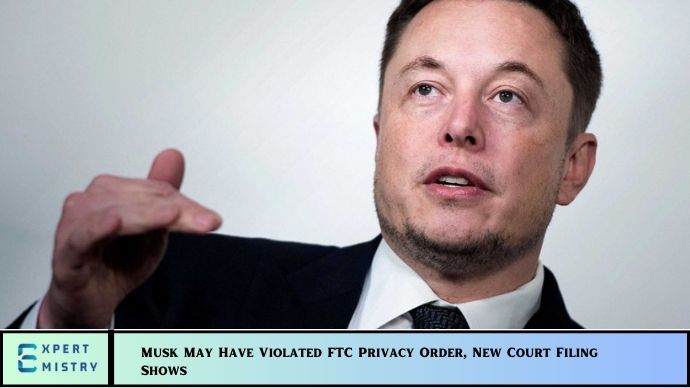In a recent development that has captured the attention of tech enthusiasts, business leaders, and privacy advocates alike, a new court filing suggests that Elon Musk, the CEO of Tesla and SpaceX, may have violated a Federal Trade Commission (FTC) privacy order. The FTC, the U.S. government agency responsible for enforcing privacy laws, had previously imposed strict privacy measures on one of Musk’s ventures, and this latest filing raises significant concerns about the adherence to these regulations.
The violation allegedly concerns Musk’s involvement with Twitter, the social media platform he acquired in 2022. If proven, these actions could have serious legal and financial consequences for Musk and his companies. This blog post will dive deep into the details of the court filing, what this violation could mean for Musk, the FTC’s privacy order, and how this issue may impact consumers, investors, and the broader tech industry.
What Is the FTC Privacy Order and Why Does It Matter?
To understand the gravity of the situation, it’s important to first explore what the FTC privacy order entails and why it was put in place.
The FTC (Federal Trade Commission) is an independent agency of the U.S. government tasked with protecting consumers from unfair practices and enforcing antitrust laws. In recent years, the agency has become increasingly focused on data privacy and the collection of personal information by tech companies.
The FTC privacy order that Musk allegedly violated stems from a broader effort to protect consumers’ personal data from misuse or mishandling. Companies that collect consumer data must comply with specific guidelines around how they store, protect, and use that data. For companies like Twitter, which handle vast amounts of user data, these regulations are crucial to ensuring the privacy and safety of millions of users.
In the case of Musk’s involvement, the FTC had previously investigated Twitter over concerns about user privacy practices. In 2011, the FTC imposed a consent decree on Twitter, requiring the company to implement stronger privacy protections. This order was meant to safeguard users’ data and enforce transparency regarding data collection practices.
What Does the New Court Filing Reveal?
A court filing revealed that Musk’s actions, or rather his companies’ actions under his leadership, may have violated the terms of the FTC’s privacy order. The filing details that Twitter may have mishandled user data or failed to adequately secure private information as required under the privacy regulations.
The violation reportedly involves multiple facets of data protection, ranging from how Twitter collects and stores personal information to how it handles user privacy requests. As the filing outlines, the FTC privacy order mandates strict controls on how companies use and share personal data — and this recent filing suggests that Musk’s companies may have fallen short in these areas.
Given Musk’s prominent role at Twitter, these alleged violations could carry serious repercussions, including fines or further regulatory scrutiny. The implications for Musk personally, as well as for his companies, could be substantial if these violations are proven in court.
The FTC Privacy Violations: What Could They Mean for Musk?
If it is confirmed that Musk or his companies violated the FTC’s privacy order, several consequences could arise. Let’s explore what that might mean legally, financially, and for Musk’s reputation.
1. Financial Penalties
One of the most immediate consequences of a FTC privacy violation is the possibility of financial penalties. The FTC has a history of imposing hefty fines on companies that fail to comply with privacy orders. For example, in 2019, Facebook was fined a record $5 billion over privacy violations, largely stemming from the Cambridge Analytica scandal.
Although the amount of any potential fine in Musk’s case remains to be seen, it’s clear that a violation of the FTC’s privacy order would likely result in a significant financial penalty. Given Musk’s high-profile leadership roles and the scrutiny surrounding his companies, this could be one of the most high-profile privacy enforcement actions in recent years.
2. Increased Regulatory Scrutiny
If proven, the violation could lead to increased scrutiny of Musk’s other ventures, particularly Tesla and SpaceX. The FTC might expand its investigation into other aspects of Musk’s business operations, which could result in additional regulatory hurdles.
Musk’s companies could face greater challenges in terms of meeting data protection standards, both in the U.S. and internationally. Privacy regulations in regions like the European Union are becoming increasingly strict, so Musk could be dealing with not only FTC sanctions but also penalties in other countries.
3. Reputation Damage
While Musk’s business ventures have historically been known for their innovation and success, this violation could tarnish his public image, particularly among consumers who are sensitive to issues like data privacy. Public trust is crucial in the tech world, and any perceived failure to protect user data could result in backlash from Twitter users, Tesla customers, and investors alike.
The issue of privacy violations also raises concerns about how Musk’s companies handle consumer information. Given the prominence of Musk’s brands, this incident could be viewed as a warning to other tech executives about the importance of complying with data protection regulations.
4. Legal Repercussions for Twitter
Given that Twitter is the company involved in this FTC privacy order violation, the social media giant could face legal action. If the court finds that Twitter violated the terms of the order, it may be required to take corrective actions, such as improving privacy practices, disclosing data usage policies, or even making changes to how user data is processed.
This situation could also have long-term implications for Twitter’s business as a whole. The company might face additional scrutiny from both users and investors about how it handles user data. In the future, users may be more reluctant to share personal information on the platform, potentially impacting user growth and engagement.
Potential Solutions for Musk and Twitter
If the allegations are true, there are several ways Musk and Twitter could remedy the situation:
1. Strengthening Data Privacy Measures
To address the FTC’s concerns, Twitter could immediately implement stronger data privacy measures. This could include revising data storage protocols, implementing more stringent user consent processes, and ensuring compliance with data protection laws across all markets.
2. Transparency with Users
Increasing transparency about how user data is collected, stored, and shared could also go a long way toward restoring public trust. Twitter could be more proactive in informing users about its data policies, and offering clearer privacy settings for account holders.
3. Cooperation with the FTC
It’s possible that Twitter could cooperate with the FTC to resolve the issue, implementing the necessary changes in exchange for a reduced fine or less severe penalties. This approach could help mitigate the reputational damage Musk and Twitter are likely to face in the coming months.
May you also like it:
SK hynix Commercializes World’s Fastest Mobile DRAM LPDDR5T
3nm GAAFET: Samsung Tapes Out First Mobile SoC With Synopsys AI Tools
Samsung Tapes Out First 3nm Smartphone SoC, Gets a Boost from Synopsys AI-Enabled Tools
FAQs
1. What is the FTC privacy order?
The FTC privacy order mandates that companies implement strong safeguards around the collection, storage, and use of consumer data, ensuring that personal information is protected.
2. What could be the consequences for Musk if proven guilty of violating the FTC privacy order?
Consequences could include financial penalties, increased regulatory scrutiny of his other companies, and damage to his public reputation.
3. How could this affect Twitter’s users?
If Twitter violated the FTC’s privacy order, users could see changes in the platform’s data privacy policies, and may become more cautious about sharing personal information.
4. What are the financial penalties for violating the FTC privacy order?
The FTC can impose significant fines for privacy violations, with the amount depending on the severity of the breach. Facebook was fined $5 billion for similar violations in 2019.
5. What steps can Musk and Twitter take to resolve this issue?
Musk and Twitter can address the violation by strengthening data privacy measures, being transparent with users, and cooperating with the FTC to comply with privacy regulations.
Conclusion
The recent court filing alleging that Elon Musk and his company Twitter may have violated a FTC privacy order has raised serious concerns about data protection practices in the tech industry. As the situation develops, the financial, legal, and reputational consequences for Musk and his companies could be significant. It’s clear that privacy issues will continue to play a major role in shaping the future of consumer trust and regulatory compliance in the tech world.
For Musk, this situation underscores the growing importance of privacy regulation compliance, not only in the U.S. but across the globe. Whether this leads to a major overhaul in how Twitter handles user data, or a lengthy legal battle, it is certain that this case will have lasting implications for both Musk’s companies and the broader tech landscape.

